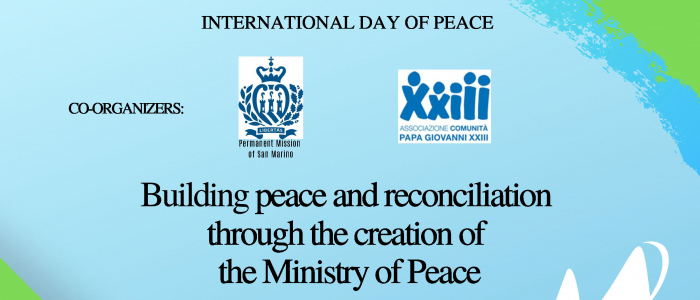Building peace and reconciliation through the creation of the Ministry of Peace
Parallel Event in conjunction with the 42nd Regular Session of the Human Rights Council (9-27 September 2019)
The 21 September 2019 has marked the International Day of Peace, a day established by the General Assembly of the United Nations to strengthening the ideals of peace, both within and among all nations and peoples, in the spirit of the “Declaration and Programme of Action on a Culture of Peace”.
At the High-level Meeting on Peaecebuilding and Sustaining Peace of the GA in April 2018, it was emphatically asserted that “peace is more than ceasefire. It is more that a peace deal. And, it is more than the absence of war”. For that, there is a need to tackle conflicts at its roots. There is need to invest in achieving sustainable peace. To make peace last long for the benefit of humanity, it is essential to build a culture of peace. The High Level Meeting reiterated that “sustaining peace is not an easy task” and “making peace is harder than silencing the guns”.
Building peace is an on-going process: even once it seems to be achieved, we cannot take for granted that it will last forever; we need continuous efforts to maintain it. Only by building peace day after day, a peace strictly linked to development and the respect for human rights, we can generate peaceful, just and inclusive societies.
It is indeed essential for States to make long-term multilevel investments that create fertile ground for peace and conflict resolution at national level as well as to coordinate planning and programs among various States with a view to cooperate in implementing peace at the international level.
In adopting the 2030 Agenda for Sustainable Development in 2015 and introducing the Sustainable Development Goal 16 “Peace, Justice and Strong Institutions”, the Member States recognised that it would not be possible to build a peaceful world if steps are not taken to achieve economic and social development for all people everywhere, and ensure that their rights are protected. Goal 16 calls for promoting peaceful and inclusive societies for sustainable development, providing access to justice for all and building effective, accountable and inclusive institutions at all levels.
Looking at the values that these “peaceful, just and inclusive societies” should have (equal access to justice, respect for human rights, effective rule of law, good governance, transparent, effective and accountable institutions), we can easily deduce that also the peace that the 2030 Agenda refers to is a positive and broad peace.
In this perspective the implementing of peace policies from the national level is essential in order to promote infrastructures such as the Ministry of Peace, fostering an art of Peace diplomacy. A diplomacy as an art of authoritatively dialogue, focusing on a comprehensive concept of peace and promoting a human rights centred approach and the culture of disarmament as a collective responsibility.
Moderators:
- Mr. Marcello Beccari, Ambassador of the Permanent Mission of San Marino to the United Nations Office and other international organizations in Geneva – Speech
- Dr. Maria Mercedes Rossi, main representative of Associazione Comunità Papa Giovanni XXIII (APG23) – Speech
Speakers:
- Mr Guerrino Zanotti, Ministry of Home Affairs and Minister of Peace of the Republic of San Marino – Speech
- Mr Giovanni Paolo Ramonda, General Responsible of Associazione Comunità Papa Giovanni XXIII (APG23) – Speech ENG ITA
- H. E. Msgr Ivan Jurkovic, Apostolic Nuncio, Permanent Observer of the Holy See to the United Nations and other International Organizations in Geneva – Speech
- Mr Antonino Drago, Professor of the University of Naples “Federico II” and contract professor in Sciences for Peace at the University of Pisa and Firenze (Italy) – Speech
- Ms. Zaira Zafarana, Representative of Internationa Fellowship of Reconciliation (IFOR) – Speech
Co-organisers:
- Permanent Mission of San Marino to the United Nations Office and other international organizations in Geneva;
- Associazione Comunità Papa Giovanni XXIII (APG23);
Other Co-sponsors:
- Permanent Mission of the Republic of Costa Rica to the United Nations Office and other international organizations in Geneva;
- Permanent Mission of the Holy See to the United Nations Office and other international organizations in Geneva;
- Permanent Mission of Italy to the United Nations Office and other international organizations in Geneva;
- UPEACE, University for Peace established by the General Assembly of the United Nations;
- Human Rights Centre “Antonio Papisca” of the University of Padova;
- Chair UNESCO “Human Rights, Democracy and Peace” of the University of Padova;
- Fondazione Vittorino Chizzolini, ONLUS, BERGAMO;
- Caritas internationalis (Confederation of Catholic Charities);
- International Fellowship of Reconciliation (IFOR)


